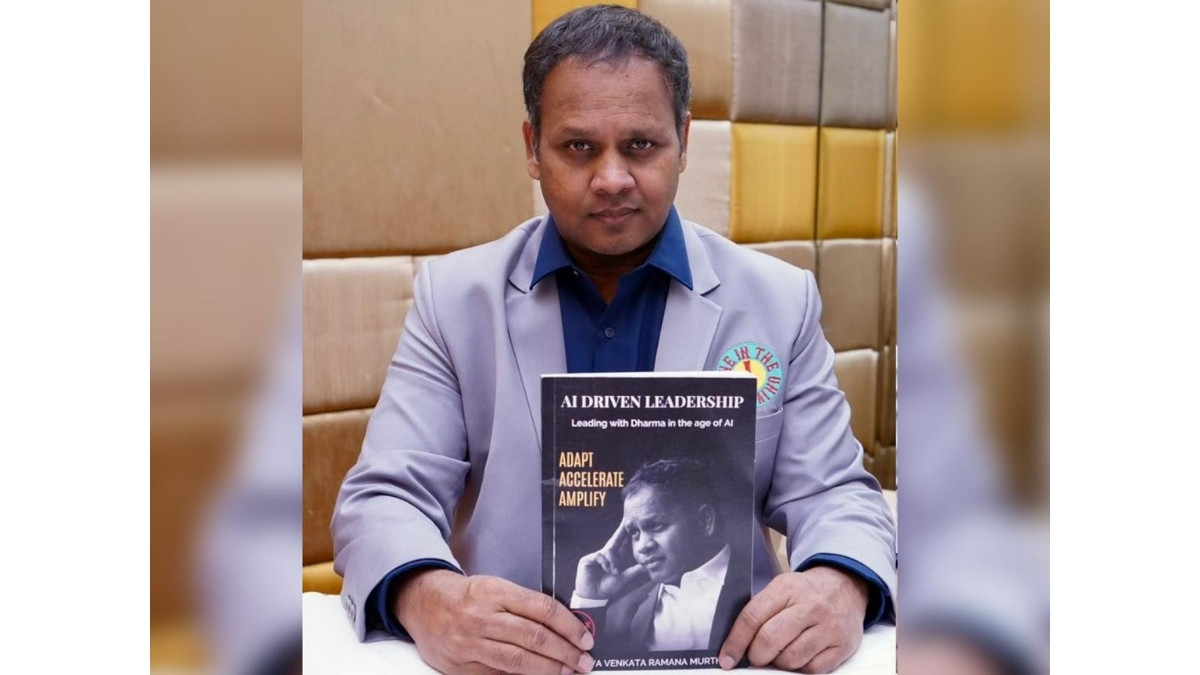New Delhi [India], August 2: At a moment in history when artificial intelligence is rewriting every norm of how we work, live, and even decide one author has introduced a pause that feels both ancient and urgent. Kuruva Venkataramana Murthy, renowned leadership coach and founder of One in the Universe, has brought forth a philosophical and strategic guide for the algorithmic age with his book, AI-Driven Leadership: Leading with Dharma in the Age of AI.
The book’s impact has gone well beyond bookshops and boardrooms. Over the past week, the hashtag #KuruvaVenkataramanaMurthy climbed into the Top 5 trends on X (formerly Twitter) first in India, and shortly thereafter in the UAE, Singapore, and parts of the UK and Canada, where diaspora professionals have picked up the book and shared key excerpts.
From Viral Hashtag to Global Dialogue
What started with a few thought leaders quoting Murthy’s reflections on leadership ethics soon turned into a global conversation. Posts quoting lines such as “Efficiency without ethics is erosion in disguise” and “The speed of AI must be anchored by the stillness of awareness” have been shared thousands of times.
These were not promoted campaigns. The rise of #KuruvaVenkataramanaMurthy was entirely organic, driven by community educators, design thinkers, product managers, and spiritual influencers who found in Murthy’s book a vocabulary they didn’t know they needed.
At its core, the book suggests that leadership in the AI era is not about control but about conscious navigation an inner compass grounded in the principle of Dharma.
A Human Beginning: Mothers at the Launch
The launch itself was symbolic of Murthy’s intent to return leadership to its roots. In Hyderabad, rather than a celebrity or industrialist, it was a group of mothers who unveiled the book. The gesture, Murthy later explained, was deliberate.
“In a world obsessed with metrics and speed, mothers remind us of meaning and stillness. They are the original stewards of Dharma,” he said.
The launch quietly subverted the usual optics of business books, reinforcing a central idea in Murthy’s writing: leadership begins at home, within the self.
The Triple Shift: Adapt. Amplify. Accelerate.
The book introduces what Murthy calls the AAA Framework, a Dharmic model for navigating disruption:
- Adapt with inner clarity, not panic.
- Amplify values, not just capabilities.
- Accelerate with purpose, not impulse.
It blends classical Indian concepts like Swadhyaya (self-inquiry), Viveka (discernment), and Sambandh (human connection) into actionable ideas for modern leaders from startup founders to educators and civic leaders.
Unlike typical leadership books focused on KPIs or systems design, Murthy’s text is filled with rituals, reflection questions, and what he calls “Empathy Loops” simple exercises to return leadership to a state of listening.
An Ethics-Centered Panchsheel for the AI Age
Murthy doesn’t shy away from confronting the ethical challenges posed by rapid AI adoption. In response, he proposes a five-principle Panchsheel tailored for today:
- Satyam: Honest data, not manipulative design
- Ahimsa: Reducing unintended digital harm
- Seva: Building tech to uplift the underserved
- Viveka: Choosing what not to automate
- Sambandh: Strengthening not replacing human bonds
These aren’t positioned as idealistic sentiments. They serve as operational filters for leadership decisions.
Reader Response: Beyond Business
One early reader, a young developer based in Pune, shared this reflection:
“I thought leadership was about strategy. But this book made me feel like it’s first about self. It’s not just for the workplace it’s for the kind of person I want to be in the world of AI.” Ravi Sharma, Software Engineer
This kind of feedback has been echoed in spiritual circles, corporate book clubs, and even academic forums discussing ethics in design and policy.
A Cultural Book, Not Just a Business One
AI-Driven Leadership: Leading with Dharma in the Age of AI is not confined to one genre. It speaks to ethics in design, conscious capitalism, spiritual education, and digital wellbeing. It’s being picked up by people who may not even use the word “leadership” for themselves but who are navigating complexity with care.
The book’s cross-disciplinary impact is perhaps why its online momentum hasn’t slowed. With over 20,000 organic mentions in just 10 days across X and LinkedIn, Murthy’s work is being translated not into new languages yet but into new ways of thinking.
Looking Ahead
For Murthy, this isn’t about virality or visibility. He has often stated that “books don’t change systems. They change people. And people change systems.”
And perhaps that’s what AI-Driven Leadership: Leading with Dharma in the Age of AI is doing changing the questions we ask, so we don’t just adapt to AI, but awaken through it.

